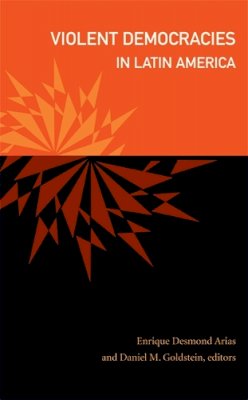
Violent Democracies in Latin America
Goldstein
The contributors—anthropologists, political scientists, sociologists, and historians—explore how individuals and institutions in Latin American democracies, from the rural regions of Colombia and the Dominican Republic to the urban centers of Brazil and Mexico, use violence to impose and contest notions of order, rights, citizenship, and justice. They describe the lived realities of citizens and reveal the historical foundations of the violence that Latin America suffers today. One contributor examines the tightly woven relationship between violent individuals and state officials in Colombia, while another contextualizes violence in Rio de Janeiro within the transnational political economy of drug trafficking. By advancing the discussion of democratic Latin American regimes beyond the usual binary of success and failure, this collection suggests more sophisticated ways of understanding the challenges posed by violence, and of developing new frameworks for guaranteeing human rights in Latin America.
Contributors: Enrique Desmond Arias, Javier Auyero, Lilian Bobea, Diane E. Davis, Robert Gay, Daniel M. Goldstein, Mary Roldán, Todd Landman, Ruth Stanley, María Clemencia Ramírez
Product Details
About Goldstein
Reviews for Violent Democracies in Latin America
Isabel DiVanna
Canadian Journal of History
“Violent Democracies in Latin America presents a nuanced study of the interactions between trade liberalization, neoliberal economic systems, and the political environment of post-authoritarian Latin America that subverts many of the previous ideas on the democratic transition and offers useful insights for scholars into the political economic context of the period. As contributors include an anthropologist, several historians, a political scientist, and a sociologist, the volume will reach a wide audience and contribute to the growing dialogue on contemporary Latin American politics.”
Irene Depetris Chauvin
Hispanic American Historical Review
“[T]his book presents a new research agenda on the problems of governance, democracy, and security in Latin America. The concept of violent pluralism that it advances requires a precise examination of the existing connections between different forms of violence, as well as a deep understanding of the autonomy that certain forms of violence might have with respect to others.”
Hugo Frühling
Latin American Politics and Society
“Contributors to the volume Violent Democracies in Latin America do an excellent job of opening new paths for exploring this abiding question. . . . This edited volume is remarkably coherent and the chapters fit together nicely. . . . [E]ach chapter makes a unique contribution to the interdisciplinary conceptualization of violent pluralism.”
Kedron Thomas
Anthropological Quarterly
“The case studies are uniformly good—well researched and written on important and interesting topics. . . . Violent Democracies makes an important contribution in focusing our attention on the perpetuation of violence as Latin American countries continue in their democratization process.”
Charles D. Brockett
A Contracorriente
“The studies presented here suggest that there is no simple route by which Latin American political democracies could become less violent, because violence has not only been institutionally integral to the way state power is exercised and class privileges are maintained within the region, but has also been exacerbated by its insertion into a neoliberal capitalist international system.”
John Gledhill
Journal of the Royal Anthropological Institute
